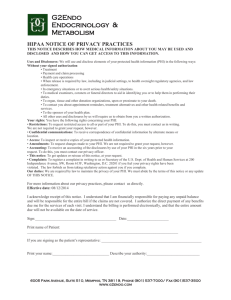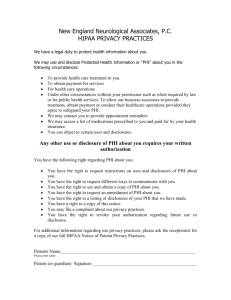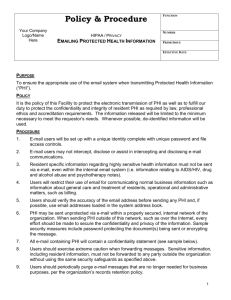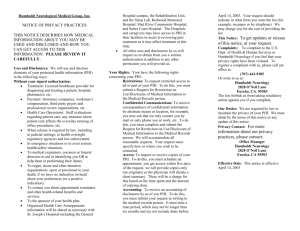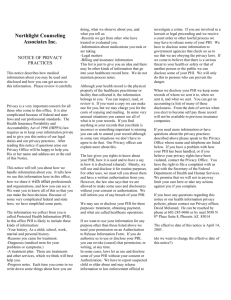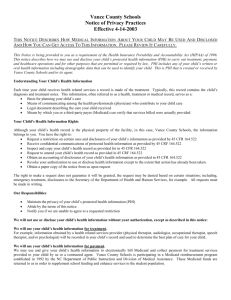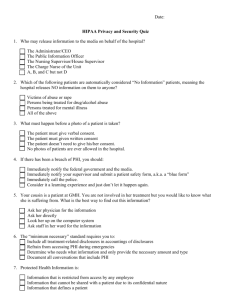notice of privacy practices - Associates in Counseling and Personal
advertisement
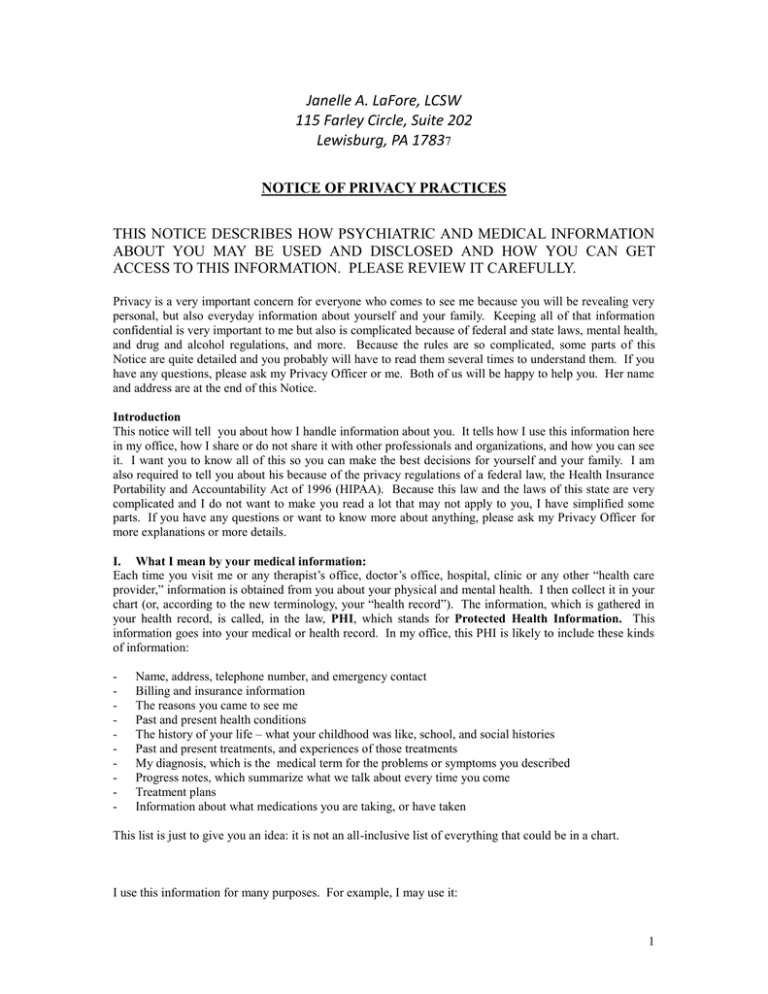
Janelle A. LaFore, LCSW 115 Farley Circle, Suite 202 Lewisburg, PA 17837 NOTICE OF PRIVACY PRACTICES THIS NOTICE DESCRIBES HOW PSYCHIATRIC AND MEDICAL INFORMATION ABOUT YOU MAY BE USED AND DISCLOSED AND HOW YOU CAN GET ACCESS TO THIS INFORMATION. PLEASE REVIEW IT CAREFULLY. Privacy is a very important concern for everyone who comes to see me because you will be revealing very personal, but also everyday information about yourself and your family. Keeping all of that information confidential is very important to me but also is complicated because of federal and state laws, mental health, and drug and alcohol regulations, and more. Because the rules are so complicated, some parts of this Notice are quite detailed and you probably will have to read them several times to understand them. If you have any questions, please ask my Privacy Officer or me. Both of us will be happy to help you. Her name and address are at the end of this Notice. Introduction This notice will tell you about how I handle information about you. It tells how I use this information here in my office, how I share or do not share it with other professionals and organizations, and how you can see it. I want you to know all of this so you can make the best decisions for yourself and your family. I am also required to tell you about his because of the privacy regulations of a federal law, the Health Insurance Portability and Accountability Act of 1996 (HIPAA). Because this law and the laws of this state are very complicated and I do not want to make you read a lot that may not apply to you, I have simplified some parts. If you have any questions or want to know more about anything, please ask my Privacy Officer for more explanations or more details. I. What I mean by your medical information: Each time you visit me or any therapist’s office, doctor’s office, hospital, clinic or any other “health care provider,” information is obtained from you about your physical and mental health. I then collect it in your chart (or, according to the new terminology, your “health record”). The information, which is gathered in your health record, is called, in the law, PHI, which stands for Protected Health Information. This information goes into your medical or health record. In my office, this PHI is likely to include these kinds of information: - Name, address, telephone number, and emergency contact Billing and insurance information The reasons you came to see me Past and present health conditions The history of your life – what your childhood was like, school, and social histories Past and present treatments, and experiences of those treatments My diagnosis, which is the medical term for the problems or symptoms you described Progress notes, which summarize what we talk about every time you come Treatment plans Information about what medications you are taking, or have taken This list is just to give you an idea: it is not an all-inclusive list of everything that could be in a chart. I use this information for many purposes. For example, I may use it: 1 - To call you if I have to change or verify your appointment time To show that you were here on a certain date and what services were provided To bill your insurance for the dates of service To review what we talked about so that I can think about possible future treatments To decide how well the treatments are going To consider if I should refer you to a specialist When you understand what is in your record and what it is used for, you can make better decisions about who, when, and why others should or should not have this information. Privacy and the laws The HIPAA law requires me to keep your PHI private and to give you this notice of my legal duties and of my practices with regard to maintaining your privacy. This notice is called NPP, or Notice of Privacy Practices. I will obey the rules of this notice as long as it is in effect. I also reserve the right to change these rules and practices at any time as long as the changes do not breech any federal or state laws, or any regulations regarding mental health information. The rules of the new NPP will apply to all the PHI that I keep, past, present and future. If I change the NPP, I will post a new Notice in the waiting room where everyone can see it. You and anyone else can get a copy from my Privacy Officer at any time. II. How your protected health information can be used and disclosed (This section will talk about how PHI is used in day-to-day functioning of the office. Later, I will give you more information about how I cannot reveal any of your PHI.) The legal definition of the word “use” applies to sharing health information between or among my employee(s) and me in my practice. (Currently, my only employee is Della Wright, who works in the Lewisburg office.) The term, “disclosure”, in the law, refers to information which is shared or sent to others outside of my practice. Except in special circumstances described below, when I use your PHI here or disclose it to others, I share only the minimal necessary PHI needed for the purpose. The next section of this Notice tells you about how your PHI is used and disclosed. I use and disclose PHI for several reasons. Mainly, I use and disclose (share) PHI for routine purposes to help your treatment (like calling in a prescription), to arrange payment (like billing your insurance company), and to allow for health care or office operations (like compliance with federal regulations). TPO is the term being used to describe “treatment, payment and health care operations”, which basically means routine office activities. For uses and disclosures other than those for TPO, an Authorization or Consent may be required but not in all cases. I will explain all of this below. A. Uses and disclosures of PHI I health care with your consent After you have read this notice, you will be asked to sign a Consent Form to allow me to use and disclose your PHI for TPO. Reread that last sentence to be sure you understand it. 1. For treatment, payment and health care operations I need information about you and your condition in order to provide care to you. I need to collect the information and to use it and disclose it as necessary to care for you properly. I will explain more completely what is meant by TPO. For Treatment I use your PHI to provide you with psychiatric treatment and services. These might include individual, family or group therapy, certain kinds of testing, treatment planning, prescribing medications, or measuring the effects of my services. 2 I may share or disclose your PHI to others who might be involved in your treatment or who are providing treatment to you in different ways. I often share information with the family physician, but usually only with your authorization. I may need to give your name to a lab where you had blood work done in order to get the results. If it were to happen that a team was involved in your care, I would need to share information with other members of the team to coordinate the best treatment. I may refer you to other professionals or consultants for services that I cannot offer, such as special testing, labs, x-rays, sleep labs, etc. when I do this, I need to tell them some things about you and your conditions (like your name and the reasons the tests are needed). I will get their results and opinions which will go into your chart. If you receive treatment in the future from other professionals, I can also share your PHI with them. These are some examples so that you can see how I use and disclose your PHI for treatment purposes. For Payment My office staff and I may use and disclose your PHI for our payment purposes as well as payment purposes of other health care providers and health plans. This would be to bill you, your insurance, or others in order to be paid for the treatment I provide to you. We may contact your insurance company to check on what your insurance covers. In order for them to send payment, they need the diagnosis, dates of service, types of treatment given, and what I expect to be the outcome, as well as other similar information from time to time. They may need additional information to coordinate benefits with another insurance company, or for you to get reimbursement from them. Only the minimum necessary information will be provided. For health care Operations My office staff and I may use and disclose your PHI for our health care operation purposes as well as certain health care operation purposes of other health care providers and health plans. Some examples are quality assessment and improvement activities, and accreditation, certification, licensing and credentialing activities, and administrative activities to prove compliance with federal regulations. In some of those circumstances, all identifying information might be removed so that no one could tell who the information referred to. Other specific examples Appointment Reminders: My staff and I may use and disclose PHI to reschedule or remind you of appointments for treatment or other care. If you want me to call or write to you only at one place (like your home) but not another (like your work), or would like to make other special arrangements as to how my staff and I should contact you, please let us know on the attached form at the end of this notice. We often can arrange for your requests if they are reasonable. Treatment alternatives, or other benefits and services: My staff and I my use or disclose your PHI to tell you about or recommend possible treatment alternatives that my be of interest to you, or to tell you about health-related benefits or services. B. Uses and disclosures for purposes other than TPO not requiring consent or authorization. The information that follows will be a very inclusive list of circumstances, some of which are extremely unlikely to occur, but which are listed for the sake of completeness. 1. Coroners, medical examiners, and funeral directors: Use and disclosure of PHI could occur for purposes of providing information to a coroner or medical examiner for the purpose of, for example, identifying a deceased patient or facilitating the performance of other duties required by law. A similar situation, however unlikely, could occur with regard to organ and tissue donation. 2. Health oversight activities. Use and disclosure of PHI could occur for purposes of health oversight activities authorized by law. Examples are to comply with licensure proceedings or inspections to comply with the Drug Enforcement Agency. 3. Specialized government functions. Use and disclosure of PHI could occur for purposes involving specialized government functions, for example, for national security and for correctional institutions or other custodial situations. 3 4. Law enforcement. Examples under this heading are to comply with the mandatory legal requirement to report a gun shot wound or to respond to a request for information about a crime victim. 5. Worker’s compensation and similar programs. PHI may be used or disclosed to the extent necessary to comply with laws relating to worker’s compensation or similar programs, such as submitting a claim for payment to your employer’s worker’s compensation carrier if you are treated for a work injury. 6. Litigation. If a patient files a complaint or lawsuit against me, I may disclose relevant PHI regarding that patient in order to defend myself. 7. Notification purposes. Use and disclosure of PHI may occur to notify or to assist in the notification of a family member or other personal representative in the case of severe illness or death. For example, if you were hospitalized, I would notify someone in your family or one of your friends about your condition and location. I might also notify a disaster relief agency, such as the Red Cross, if that were appropriate. 8. Individuals involved in care or payment of care. Use or disclosure of PHI may occur with someone involved in your care or payment of your care, such as a spouse or family friend. This ordinarily would only occur with your Authorization. 9. Required by law. Use and disclosure of PHI may occur as a result of complying with federal, state or local law. Examples are mandatory reports of births and deaths, driving impairments, and blood alcohol testing, or public health activities like reporting communicable diseases, adverse drug reactions, child abuse and neglect, and adult or domestic abuse. If I have reason to believe that a child I am seeing may be experiencing abuse or neglect, I am mandated to report this, usually to Childline or to the Department of Public Welfare. Similarly, if there is suspicion of elder or adult abuse or neglect, a report will be required, usually to the Department of Aging. Once a report is filed, I may be required to provide additional information. 10. Judicial and administrative proceedings. If you are involved in a court proceeding and a request is made for information concerning the professional services I provide you or the records I keep, such information is protected under state law. I will not release the information without your written authorization or a court order. This privilege does not apply if the evaluation is court-ordered. If you are involved in or are contemplating litigation, you should consult your attorney to determine whether a court order would be likely to order me to disclose information. 11. Serious threat to health or safety. I may use and disclose PHI for purposes involving a threat to public safety, including notifying appropriate third parties and, possibly, the potential victim(s). If a patient seriously threatens to harm himself/herself, I may be obligated to seek hospitalization for him/her, or to contact family members or others who can help provide protection. 12. Business associates. Certain functions of my practice may, at times, be performed by a business associate such as a billing company or a law firm. I may disclose PHI to my business associates and allow them to create and receive PHI on your behalf. For example, I m ay share your name and address with a billing company so that they will be able to file a claim on your behalf with your insurance company. When I have business arrangements like that, HIPAA requires that I have specific Business Associate Agreements so that the Business Associates also are bound by the same HIPAA regulations that I am. This is an appropriate place for me to tell you about my business relationships with the other Associates in Counseling and Personal Development in the Lewisburg office and with Michael W. Gillum, MA in the Williamsport office. Each Associate in the Lewisburg office, Michael Gillum in the Williamsport office and I are all individual and independent private practitioners: that means that our practices are independent of and separate from each other, even though we share the same office space. That means that they are all Business Associates of mine and they each have signed a Business Associate Agreement with me so that they are protecting your PHI with the same strict standards that I am. When it happens that two of us are treating the same patient, the patient will need to sign an Authorization so that we will be able to disclose more information to each other than the minimum information that is necessary to help each other out in the office (like taking messages for each other or seeing you in the waiting room). 4 13. Incidental disclosures. There may be incidental disclosures of PHI as a by-product of an otherwise permitted use or disclosure. For example, other patients may hear your name in the waiting room or may see you there. 14. Creation of de-identified information. This refers to the process of removing all identifying features from your health record. For example, if I were to become involved in a research project, I would remove all of the identifying features from your health record so that no one would be able to tell who the record belonged to originally. 15. Consultation with an expert. I may occasionally find it useful to consult with other health and mental health professionals about a case. During a consultation, I make every effort to avoid revealing the identity of the patient. The other professionals are also legally bound to keep information confidential. If you do not object, I will not tell you about these consultations unless I feel that it is important to our work together. I will note all consultations in your health record so that you would be able to know about them if you wanted. 16. Cell phone. In order for you to leave messages with me during off hours and, sometimes, in order for me to call you back in a timely manner, I use my cell phone. As you are probably aware, conversations on a cell phone can be intercepted and, therefore, are not as private as interchanges on a wired phone. Please let me know if this is a concern for you. 17. Emergencies. If there is an emergency, I will disclose information to others who I believe you would have wanted me to provide with information about you in that circumstance. If I do share information in an emergency, I will tell you as soon as I can. If you do not approve, I will stop as long as it is not against the law. C. Uses and disclosures requiring Authorization If your PHI is to be disclosed for anything other than TPO or the situations listed above, I will need your permission on an Authorization. An Authorization is written permission signed by you (or the child’ legal representative) to disclose only specific information to a specific person for a particular reason. This Authorization may be revoked by you at any time as long as it is in writing. However, the Authorization cannot be revoked to the extent that I have already given out information based on it or if the Authorization was obtained as a condition of obtaining insurance coverage, and the law provides the insurer the right to contest the claim under the policy. III. Patient privacy rights Although your health record is the physical property of the health care practitioner or facility that created it, the information belongs to you. You can inspect, read, and review it. If you want a copy, I can make one for you for the costs of copying (and mailing if you wanted it mailed to you). I would tell you the cost before copying it. In some situations, you cannot see all of what is in your records. If you find anything in your records that you think is incorrect, or something important is missing, you can ask that I amend your record, although in some rare situations, I do not have to agree to do that. If that is the case, I will have to tell you why within a limited amount of time. You may then request further review if you would like. With regard to any of these circumstances, you will need to make your requests with regard to your PHI in writing to the Privacy Officer. We have forms that you should use if you are making any requests. As mentioned earlier, you also have the right to request that I not use or disclose any of your PHI in a specific way. I may or may not be able to comply with your request. You also may request that I only contact you in a certain way (for example, only by phone but not by mail) or only at certain locations. Please review the form that follows which specifically asks you about your preferences. You also may obtain a paper copy of this Notice of Privacy Practices if you wish. 5 In addition, you have a right to obtain, upon written request, an “accounting” (a list) of certain disclosures that I made of your PHI. This right is limited to disclosures within six years of the request and other limitations. The written request should specify the time period you would like. There may be a charge for this as well. IV. Complaints If you need more information of if you have any questions, please ask me or the Privacy Officer. If you have a problem with how I have handled your PHI or if you believe that your privacy rights have been violated, please contact the Privacy Officer. You have the right to file a complaint with us and with the Secretary of the Federal Department of Health and Human Services. The Privacy Officer will give you that address. I promise that I will not in any way limit your care here or take any actions against you if you complain. The Privacy Officer is Della McCracken and she can be reached at 3 Hospital Drive, Suite 308, Lewisburg, PA 17837. Her phone number is (570) 523-7509. The effective date of this notice is April 14, 2003. 6


